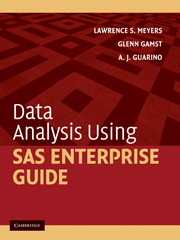Book contents
- Frontmatter
- Contents
- Preface
- Acknowledgments
- I Introducing SAS Enterprise Guide
- II Performing Analyses and Viewing Output
- III Manipulating Data
- IV Describing Data
- V Score Distribution Assumptions
- VI Correlation and Prediction
- 15 Bivariate Correlation: Pearson Product–Moment and Spearman Rho Correlations
- 16 Simple Linear Regression
- 17 Multiple Linear Regression
- 18 Simple Logistic Regression
- 19 Multiple Logistic Regression
- VII Comparing Means: The t Test
- VIII Comparing Means: ANOVA
- IX Nonparametric Procedures
- X Advanced ANOVA Techniques
- XI Analysis of Structure
- References
- Author Index
- Subject Index
19 - Multiple Logistic Regression
Published online by Cambridge University Press: 05 June 2012
- Frontmatter
- Contents
- Preface
- Acknowledgments
- I Introducing SAS Enterprise Guide
- II Performing Analyses and Viewing Output
- III Manipulating Data
- IV Describing Data
- V Score Distribution Assumptions
- VI Correlation and Prediction
- 15 Bivariate Correlation: Pearson Product–Moment and Spearman Rho Correlations
- 16 Simple Linear Regression
- 17 Multiple Linear Regression
- 18 Simple Logistic Regression
- 19 Multiple Logistic Regression
- VII Comparing Means: The t Test
- VIII Comparing Means: ANOVA
- IX Nonparametric Procedures
- X Advanced ANOVA Techniques
- XI Analysis of Structure
- References
- Author Index
- Subject Index
Summary
Overview
Multiple logistic regression is a direct extension of simple logistic regression. A logistic (S-shaped) function is used to predict a categorical variable from information provided by two or more predictor variables. As is true for multiple linear regression, it is common practice to generate the model (solution) by entering all the variables in a single step; this is sometimes called the standard or simultaneous method. However, other methods call for entering (or entering and then removing) the variables in stages or steps; there are many ways to accomplish this, and SAS Enterprise Guide provides several on a drop-down menu. We will focus here on the standard method predicting a binary dependent variable.
Everything we said in Chapter 18 regarding simple logistic regression is applicable here. One noteworthy feature of the analysis concerns the coding of binary predictor variables.
Coding of binary predictor variables
In Section 18.3.1 of the previous chapter, we discussed coding the dichotomous dependent variable. The default coding scheme used by SAS Enterprise Guide presumes that for the dependent variable the group we wish to use as the reference group is coded as 0 and that the comparison group to which we want to compare the reference group is coded as 1.
The coding scheme for the predictor binary variables has to be just the reverse of the scheme used for the dependent variable.
Information
- Type
- Chapter
- Information
- Data Analysis Using SAS Enterprise Guide , pp. 185 - 192Publisher: Cambridge University PressPrint publication year: 2009
